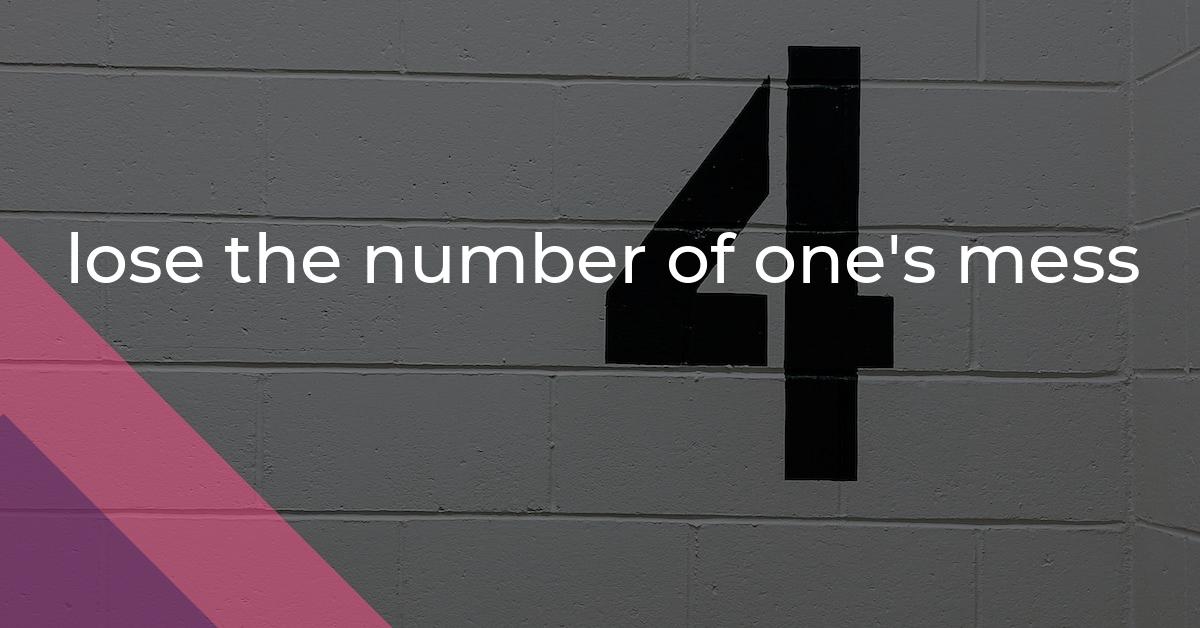lose the number of one’s mess: Idiom Meaning and Origin
What does ‘lose the number of one's mess’ mean?
The idiom "lose the number of one's mess" means to fail and make a situation worse. It suggests losing control and being unable to fix the mess.

Idiom Explorer
The idiom "spin out" refers to losing control or becoming overwhelmed by a situation, often resulting in negative consequences.
The idiom "send for a toss" means that something has been disrupted or thrown into chaos. It implies that a situation or plan has gone completely awry or off track.
The idiom "screwed up" means to make a mistake or to mess something up. It can refer to a situation that has been ruined or to a person who is behaving or performing poorly.
The idiom "rack and ruin" means to be in a state of complete destruction or collapse.
The idiom "out of one's mind" means to be mentally deranged or insane.
The idiom "off one's dot" means to be mentally unstable or crazy. It suggests that someone is not thinking clearly or rationally.
The idiom "mess up" means to make a mistake or to do something incorrectly, often resulting in a negative or chaotic outcome.
The idiom "louse up" means to spoil or ruin something. It can refer to making a mistake or causing a failure, often due to carelessness or incompetence.
The idiom "lose touch" means to no longer communicate or be in contact with someone or something, resulting in a loss of knowledge or familiarity.
The idiom "lose the bell" means to cease or avoid drawing unnecessary attention or making oneself conspicuous.
Uncovering Forgotten Digits
The idiom "lose the number of one's mess" is a lesser-known expression in the English language. While there is limited information available regarding its origins and usage, it is believed to have emerged in the 20th century. Despite its relative obscurity, the idiom encapsulates a vivid and relatable concept that can be explored further.
Based on the available information, "lose the number of one's mess" is an idiomatic phrase that conveys a sense of confusion, disorganization, or chaos. It implies that an individual or a situation has become overwhelmingly disorderly or unmanageable, to the point where one has lost track of the extent of the mess. The idiom is often used in a figurative sense to describe scenarios where a person finds themselves burdened by various problems or overwhelmed by a multitude of tasks.
The phrase "mess up", which is closely related to "lose the number of one's mess", carries a similar meaning. When someone "messes up", they make a mistake or fail to do something correctly. This can contribute to the overall disorder or chaos in one's life, reinforcing the idea of losing track of the mess. The notion of "messing up" can add depth to our understanding of the challenges and difficulties that can lead to overwhelming situations.
Similarly, the idiom "lose one's cool" is connected to the concept of losing control amidst the mess. When someone "loses their cool", they become agitated, angry, or unable to maintain their composure. This loss of emotional control can exacerbate the sense of chaos and disorder, making it even more difficult to navigate through the mess. It emphasizes the importance of emotional resilience and the impact that unchecked emotions can have on our ability to manage our lives effectively.
The phrase "lose it" also aligns with the theme of losing control in the midst of a mess. When someone "loses it", they have a complete breakdown or lose their self-control. This can manifest as a range of behaviors, from crying or shouting to irrational or impulsive actions. The idea of "losing it" underscores the overwhelming nature of the mess, suggesting that it can push individuals to their limits and result in extreme reactions.
In a similar vein, the idiom "lose one's mind" reflects the mental toll that the mess can take on an individual. When someone "loses their mind", they become mentally distressed, disoriented, or even temporarily insane. This illustrates the profound impact that chaos and disorder can have on one's mental well-being. The phrase "lose one's mind" reinforces the notion that losing track of the mess can have significant consequences, both in terms of emotional stability and overall cognitive functioning.
However, due to the scarcity of concrete details on its origin, the precise circumstances in which this idiom emerged remain uncertain. Its use is relatively infrequent, suggesting that it may have regional or cultural limitations. Additional research into literary works, historical documents, or contextual references might shed further light on its origins and early usage.
Despite the lack of definitive information surrounding this idiom, its imagery and metaphorical nature allow for various interpretations. It highlights the relatable experience of feeling overwhelmed and unable to cope with the challenges and difficulties life presents. The idiom captures a state of disorderliness that may arise from personal struggles, professional pressure, or even societal issues.
Upon analysis, it becomes clear that "lose the number of one's mess" illustrates a universal human experience. It resonates with individuals who have felt overwhelmed by the complexities of their lives, where problems and responsibilities seem to pile up without respite. The idiom serves as a reminder that despite our best efforts, life can sometimes become unmanageable, and we may find ourselves lost in the chaos.
The idiom's obscurity adds to its allure, leaving us with a sense of curiosity and a desire for further investigation. By embracing the idiom's ambiguity, we allow ourselves to engage in a deeper exploration of its meaning and significance. The enigmatic nature of "lose the number of one's mess" invites us to reflect on our own experiences and contemplate the broader human condition, providing an ever-growing opportunity for intellectual and emotional exploration.
Example usage
Analysis:
The idiom "lose the number of one's mess" is not a widely recognized or commonly used idiom. As a result, it is difficult to find specific examples of how it can be used in a sentence. There is also no clear or definitive meaning associated with this idiom, making it even harder to provide accurate examples. It is possible that this idiom may have a literal or figurative meaning related to being overwhelmed or disorganized, but without more context or information, it is hard to determine its true meaning or usage.
More "Confusion" idioms



